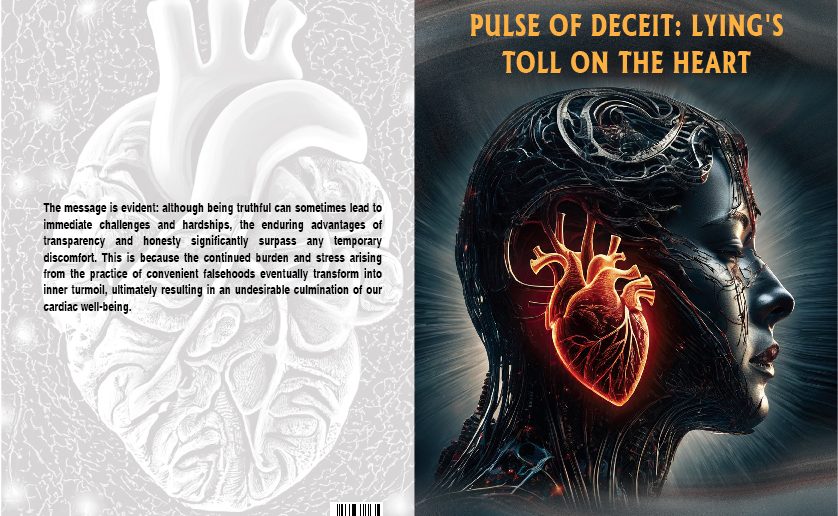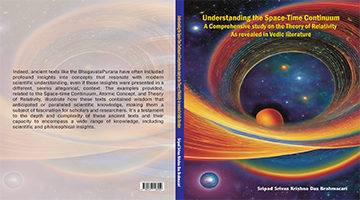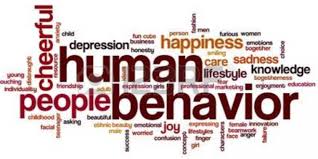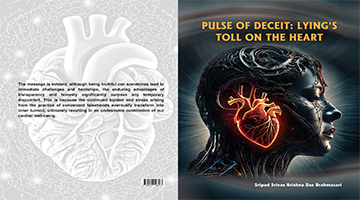Abstract: Even though we have numerous technological skills, cardiovascular diseases are a severe menace that is taking lives at a shocking rate. Our space-age achievements and Earth’s CVD threat contrast strikingly. Cardiovascular diseases are a group of medical conditions that affect the heart and blood vessels. This study examined physiological and psychological aspects of lying, revealing what happens in the body when someone lies and how it causes a cascade of effects, including an accelerated heart rate and that all-too-familiar stomach tension. Vedic literature, Ayurveda, and modern health science demonstrate the significant benefits of honesty on cardiac heart health and mental well-being. Being honest improves our relationships, cardiovascular health, and mental wellness. By reducing dishonesty, people can live healthier and more authentically. This study proves that stress from dishonesty is a major cause of cardiovascular illness. The rise in deceptive behavior mirrors the rise in cardiovascular disease mortality. Cardiovascular illnesses killed many politicians, corporate magnates, and celebrities who lived lives of lies, deceit, and betrayal to retain their social, economic, and famous standing. Thus, while expressing the truth may cause immediate problems, it is ultimately better to be honest. The constant pressure and stress created by comfy lies leads to heart discomfort and an untimely death. The lesson is clear: being honest can cause short-term troubles, but the long-term benefits outweigh them. This is because the stress and strain from telling comfortable lies leads to inner conflict and poor cardiac health.
Keywords: physiological aspects, lying, cardiovascular diseases
- INTRODUCTION
In this era of cutting-edge technology, humanity’s ambitions have reached remarkable heights, our level of technological advancement is truly awe-inspiring, enabling us to achieve feats once thought to be the stuff of science fiction [1]. Technological competence is extensive and includes many different skills, even with our scientific and technical advancements, cardiovascular diseases (CVDs) have become a serious threat that is taking lives at a startling rate. Our space-age accomplishments and the ubiquitous menace of CVDs on Earth contrast sharply [2]. The term “cardiovascular diseases” (often abbreviated as “CVDs”) refers to a collection of medical illnesses that both affect the heart and the blood arteries [3]. The following conditions fall under this broad category: coronary heart disease, which affects the blood vessels that supply the heart muscle; cerebrovascular disease, which affects the blood vessels that supply the brain; peripheral arterial disease, which concerns the blood vessels that supply the arms and legs; rheumatic heart disease, which is characterised by damage to the heart muscle and valves as a result of rheumatic fever; congenital heart disease [4], which refers to malformations of the In most cases, blockages that prevent blood from flowing to the heart or brain are the cause of heart attacks and strokes, which are two of the most deadly cardiovascular catastrophes [5]. In the US, a country renowned for its material prosperity and cutting-edge healthcare facilities. Every 37 seconds, one person dies of a cardiovascular condition, despite the startling 3.6 trillion USD that this country spends on healthcare, CVDs remain the primary cause of mortality. Heart disease claims the lives of about 647,000 Americans annually one in four fatalities. The staggering $219 billion yearly economic cost of heart disease in the United States has been rising year after year since 2014, at a pace of about 6.3 percent [6]. Taking a worldwide view reveals even more startling facts. Including disorders of the heart and blood arteries, cardiovascular illnesses are the leading cause of death worldwide [7]. Estimates for CVD-related fatalities in 2019 alone were 19.9 million, or a startling 32% of all deaths worldwide. A startling 85% of these deaths were ascribed to heart attacks and stroke. Moreover, the depressing fact is made much clearer when one looks at premature deaths, which are those that happen before the age of 68 [8]. A startling 37% of the 17 million early deaths in 2015 ascribed to non-communicable diseases were brought on by cardiovascular disease. The problem is become much more serious when one considers the unrelenting trend of CVD-related mortality. These fatalities are still increasing globally, rising by about 7% yearly. The alarming tendency of CVD-related deaths rising unabatedly needs immediate action [9].
- The Physical and Psychological Effects of Lying
While lying you may perspire, feel anxious flutters in your stomach, or notice your heart beating. That’s not everything. If the truth is revealed or your deception is about to be exposed, the physiological response may increase. The center of your chest, arms, left shoulder, elbows, and mouth may hurt. You may have trouble breathing and feel nauseated or thirsty [10]. Lightheadedness, faintness, cold sweats, and pallor may occur. According to global statistical research using face-to-face interviews, social media interactions, phone calls, and feedback form surveys, women are more likely to experience shortness of breath, nausea, vomiting, and back or jaw pain when deceived or exposed [11]. These physiological responses demonstrate how emotions and health are interconnected, we should remember that our actions and decisions can greatly affect our health. The fascinating physiological responses to lying show how our psychological state affects our bodily functioning [12]. Lying can cause physiological effects. Nervousness, perspiration, and elevated heart rate are examples, these responses are generally automatic responses to the “fight or flight” stress response, which prepares us for dangerous situations. When the lied to person learns the untruth or the liar expects it, stress can increase [13]. Anxiety can cause chest pain, deception causes stress-related chest, arm, left shoulder, elbow, jaw, and back pain. In order to have a better understanding of the connection between dishonesty, and more specifically lying, and cardiovascular diseases (CVDs), it is possible to investigate the role that stress hormones like cortisol and epinephrine play in the relationship [14]. The adrenal glands, which are located on top of the kidneys, are responsible for the production of the glucocorticoid steroid known as cortisol, which is known as the “stress hormone.” It is of critical importance in the process of reacting to a wide range of occurrences and conditions, such as responding to stressful situations, engaging in physical activity, or even lying [15]. When it comes to the maintenance of the body’s equilibrium, the systemic effects of cortisol are multifaceted and absolutely necessary. Prolonged elevations in cortisol levels, on the other hand, have the potential to have negative consequences for weight, immunological function, and the risk of developing chronic diseases [16]. Cortisol, along with its opponent epinephrine, is well-known for its participation in the “fight-or-flight” response. This reaction is characterised by a momentary increase in the production of energy in order to deal with immediate dangers. Cortisol prepares the body for the fight-or-flight response by elevating glucose levels, which in turn provides immediate energy to large muscles [17]. Additionally, cortisol inhibits insulin production, which prevents glucose from being stored and favours its immediate utilisation. The individual either resolves the problem or, if the situation is not resolved, the hormone levels remain raised. Finally, methylation is added to the process in order to produce epinephrine [18]. Elepinephrine and norepinephrine are two hormones that play a significant role in the regulation of the physiological reactions that take place in response to stressful events. The production of synthetic variants of these hormones for a variety of purposes is possible in the field of medicine.
- The Mechanism of Lying and Its Effects
Lying is a complex psychological process that triggers a cascade of physiological and emotional responses within the human brain and body [19]. Understanding this mechanism can shed light on the intricacies of dishonesty and its potential effects on our overall well-being. Here’s a detailed exploration of the journey of a lie and its consequences:
Initiation of the Lie: The moment you decide to lie; your body’s stress response is activated. This leads to the release of cortisol, often referred to as the “stress hormone,” into your brain. This initial phase is marked by the stress of fabricating a story.
Adrenaline Rush: For significant lies, an adrenaline rush may accompany the cortisol release. During this phase, your heartbeat accelerates, pupils dilate, and you may begin to sweat. These physiological responses are associated with the fight-or-flight response, as your brain perceives a potential threat and gears up to protect itself.
Cognitive Strain: Approximately 2 to 7 minutes into the lie, your brain faces the challenge of keeping track of both the truth and the fabricated narrative. This cognitive workload is taxing, particularly for your working memory, which is responsible for decision-making and problem-solving. As a result, your brain’s capacity to make sound judgments is compromised. Some individuals may compound small lies with bigger ones, as their brains grapple with the consequences of deception.
Anger and Defensive Behavior: Around 10 minutes after initiating the lie, feelings of anger may surface, especially directed towards the person you deceived. This emotional reaction aims to divert attention away from your dishonesty. Adults typically handle this better than teens but may still become defensive. The brain acknowledges that alternatives to the lie, such as the truth, exist, prompting a desire to explain one’s actions.
Worrisome Emotions: From 18 to 30 minutes following the lie, stress hormones have begun to dissipate. During this phase, you may experience feelings of worry. To counter these emotions, you might become overly apologetic or sweet to the person you deceived. Alternatively, you may resort to demonizing the person you lied to, justifying your falsehood by convincing yourself that they did not deserve the truth.
Long-Term Effects for Habitual Liars: For habitual liars, the lines between truth and falsehood can blur. Over time, individuals may lose track of reality and “live the lie.” Their brains adapt to this deceit, making it a part of their everyday lives.
Effects on Individuals Unaccustomed to Lying: Individuals who are not habitual liars often grapple with residual negative feelings about their dishonesty. They may experience negative affect when confronted with the person they lied to. This negative affect drives them to avoid the individual or act coldly as a defense mechanism against self-condemnation.
Chronic Anxiety and Health Consequences: Living with the burden of a lie can lead to chronic anxiety. The ongoing release of stress hormones like cortisol can impair cognitive function, weaken the immune system, and impact overall health. Chronic stress can increase susceptibility to ailments, such as catching a cold, and disrupt sleep patterns, exacerbating these health concerns.
- Case Studies: Public Figures and CVDs
The study examined a study on the physiological and psychological aspects of lying, revealing what happens in the body when someone lies and how it causes a cascade of effects, including an accelerated heart rate and that all-too-familiar stomach tension. This research also seeks to understand why people lie. The carefully performed study comprised 2600 male and 2600 female volunteers from a variety of tribes, financial and social origins, nations, and age categories. Their answers revealed the prevalence of dishonesty in daily encounters. A staggering 72% of respondents acknowledged to lying at least twice in one-on-one or group interactions within a week. This tendency increased in groups or while addressing larger audiences. Political and economic leaders duped 98.3% of participants, revealing a deep trust deficit in society. Over 90% of politicians and businesspeople expressed their unwillingness to trust their peers, often harbouring concerns and not sharing their hearts.
Case Study 1: Sarah W. (Age: 30, Occupation: Nurse)
Background: Sarah, a 30-year-old nurse residing in the United States, was selected for an interview to represent a younger demographic segment within our study.
Lying Habit: During the interview, it was revealed that Sarah occasionally resorts to embellishing her daily experiences to infuse more intrigue into her narratives when conversing with her peers. This tendency is, in essence, a coping mechanism used to create engaging stories or to enhance her social interactions.
Immediate Consequence: Sarah confessed that when her fabrications are discovered or challenged, she undergoes an immediate physical and emotional response. Her heart rate noticeably increases, often leading to heightened perspiration and an overall sense of anxiety. These reactions are indicative of her body’s stress response when faced with the consequences of her lies.
Long-lasting Heart Problem: Delving deeper into the potential long-term implications of her lying habit, it is evident that Sarah’s recurrent episodes of anxiety, stemming from her fabrications, can have implications for her cardiovascular health over time. Chronic stress and anxiety are well-known risk factors for heart-related complications. The ongoing strain on her body’s stress response systems may gradually elevate her susceptibility to heart issues, emphasizing the profound link between habitual lying and adverse cardiovascular effects. This case study offers a glimpse into how even relatively minor instances of dishonesty can affect an individual’s physiological and psychological well-being, ultimately underscoring the significance of understanding and addressing the habit of lying in a broader context.
Case Study 2: Raj (Age: 45, Occupation: Businessman)
Background: Raj, a 45-year-old businessman residing in India, was selected for an interview, serving as a representative of the middle-aged working population.
Lying Habit: During the interview, Raj disclosed that he has a tendency to exaggerate his company’s achievements when interacting with clients and business partners. This habit of embellishment is rooted in his desire to create a more favorable impression in the highly competitive business environment.
Immediate Consequence: As Raj weaves a web of exaggerations and falsehoods to maintain the illusion of his company’s achievements, he wrestles with persistent unease and anxiety. The pressure of upholding this constructed facade takes a toll on his mental and emotional well-being. Furthermore, he admitted to experiencing occasional bursts of anger when his dishonesty is challenged, which reflects the emotional turmoil generated by his commitment to this deceptive image.
Long-lasting Heart Problem: The long-term implications of Raj’s consistent dishonesty are significant. The chronic stress that results from his continuous efforts to sustain a false image in the business world lead to adverse cardiovascular effects. Prolonged exposure to stress hormones like cortisol and catecholamines elevate the risk of heart conditions and hypertension over time, causing mild attack at the age of 49, during march 2022. It is essential to recognize that Raj’s case highlights how dishonesty, even when rooted in professional endeavors, can have substantial consequences on an individual’s overall health and well-being.
This case study underscores the intricate relationship between the propensity for lying, ongoing stress, and their profound impact on an individual’s cardiovascular health. It serves as a reminder of the need to address and manage this issue, particularly in high-pressure professional environments.
Case Study 3: Amira (Age: 28, Occupation: Teacher)
Background: Amira, a 28-year-old teacher based in Egypt, provides valuable insights into the habits and consequences of individuals within her age group who are involved in the field of education.
Lying Habit: During the interview, Amira revealed that she occasionally resorts to telling white lies as a coping mechanism to avoid confrontations, both in her personal life and classroom interactions. Her white lies are often aimed at maintaining harmony and preventing conflicts, which she believes could disrupt the learning environment.
Immediate Consequence: While Amira’s white lies may serve the purpose of short-term conflict avoidance, they come with their own set of consequences. In situations where her falsehoods lead to complex or unexpected developments, Amira experiences periods of anxiety and tension. The fear of her lies being exposed, coupled with the potential complications that arise from these deceptions, generates immediate stress and unease in her life.
Long-lasting Heart Problem: Although no any such issues diagnosed yet bit still, the long-term repercussions of Amira’s habit of resorting to white lies are a matter of concern. The persistent stress that results from her continuous need to employ falsehoods as a conflict-avoidance strategy can have a cumulative effect on her overall health, particularly her heart. The chronic exposure to stress and its associated hormones, such as cortisol, can increase her vulnerability to long-term heart-related concerns.
Amira’s case study highlights the delicate balance individuals often seek between maintaining interpersonal harmony and the potential stressors resulting from their dishonesty. It underscores the need to address underlying causes for these habits and suggests that alternative conflict resolution strategies may be more conducive to long-term emotional and cardiovascular well-being. In summary, Amira’s experience emphasizes the intricate interplay between lying, stress, and their impact on an individual’s heart health, underscoring the importance of addressing these behaviors in various aspects of life.
Case Study 4: Diego R. (Age: 55, Occupation: Retired)
Background: Diego, a 55-year-old retiree living in Argentina, represents the experiences and habits of the elderly population. He was interviewed to gain insights into how storytelling and embellishments affect older individuals.
Lying Habit: Diego has a unique lying habit that is centered around sharing captivating stories from his past adventures. These stories are often embellished to entertain and engage his grandchildren. While Diego’s intentions are pure and focused on creating memorable moments with his family, his storytelling habit involves the occasional fabrication of details to make the narratives more exciting and engaging.
Immediate Consequence: As Diego constructs and narrates his tales, he experiences moments of nervousness and an accelerated heart rate. This emotional response may be attributed to the pressure of living up to the expectations of his audience, particularly his grandchildren. While the lies themselves are relatively harmless and designed for entertainment, the physiological response within Diego’s body, such as an elevated heart rate, suggests that even well-intentioned falsehoods can trigger stress reactions.
Long-lasting Heart Problem: Diego’s regular storytelling habit is driven by excitement and a desire to create joyous memories with his family. However, this seemingly innocuous habit may place added strain on his heart, particularly as he advances in age. Prolonged periods of increased heart rate and associated stress responses can potentially contribute to cardiac issues in his later years. It is essential to recognize that while Diego’s lies are motivated by love and the desire for connection, their physiological impact should not be overlooked.
Diego’s case study illustrates that even lies driven by positive intentions can have physiological consequences. It highlights the need for individuals, especially in their later years, to be aware of how their lying habits may affect their overall well-being, particularly their heart health. This case emphasizes the intricate relationship between lying and the physical responses it triggers, even when the lies are meant to bring joy and happiness to loved ones.
Case Study 5: Mia L. (Age: 19, Occupation: Student)
Background: Mia, a 19-year-old student from Australia, represents the experiences and habits of the younger generation. Her case study sheds light on the impact of lying on social media, especially among young adults.
Lying Habit: Mia has developed a lying habit that is centered around exaggerating her experiences on social media platforms. Her motivation behind this habit is to fit in with her peers and maintain an exciting online image. Mia, like many young adults, feels the pressure to curate an idealized version of her life to gain social acceptance and validation from her online community. She frequently embellishes her social media posts to portray a lifestyle filled with adventure, excitement, and social connections.
Immediate Consequence: Mia’s pursuit of this idealized online image leads to immediate consequences. She grapples with feelings of anxiety and restlessness as she strives to uphold the illusion of an adventurous life on social media. The pressure to continuously create and share these exaggerated stories takes a toll on her mental and emotional well-being. Mia experiences a dissonance between her online persona and her real-life experiences, which triggers these negative emotions.
Long-lasting Heart Problem: Mia’s lying habit on social media, driven by a relentless quest for validation and the need to measure up to her peers, may have long-lasting implications on her heart health. Her constant exposure to curated, idealized representations of others’ lives on social media platforms fosters an environment of comparison and competition. Over time, this can erode her self-esteem, leading to feelings of inadequacy, loneliness, and stress. These negative emotions, if left unaddressed, may indirectly affect her heart health.
Mia’s case study underscores the evolving nature of lying in the digital age, particularly on social media platforms. It reveals that the pressure to maintain an impressive online image can lead to heightened stress and anxiety, which, in turn, may have long-term consequences on an individual’s heart health. This case serves as a reminder that the impact of lying extends beyond immediate physiological responses and can influence mental and emotional well-being, especially among younger generations growing up in the age of social media.
Case Study 6: Liam (Age: 50, Occupation: Lawyer, Location: UK)
Background: Liam, a 50-year-old lawyer based in the UK, offers insights into how lying within the professional realm can impact one’s life and heart health.
Lying Habit: Liam has developed a habit of overstating the strength of his clients’ cases to maintain their trust and confidence. In the competitive and high-pressure field of law, he feels the need to reassure his clients, even if it means painting a more optimistic picture of their legal prospects. This habit stems from a genuine desire to support and advocate for his clients effectively.
Immediate Consequence: Liam’s lying habit leads to immediate consequences that affect his mental and emotional well-being. He frequently experiences stress and unease, particularly when he struggles to deliver the promised outcomes. The weight of his falsehoods, even if well-intentioned, creates a burden of anxiety. He understands that maintaining the facade of unwavering legal strength can lead to unrealistic expectations, and the fear of failing his clients haunts him.
Long-lasting Heart Problem: Over time, the repercussions of Liam’s lies in the professional domain begin to manifest. His professional integrity and reputation suffer as his clients realize the gap between expectations and reality. This realization results in sustained stress, leading to increased risk of heart-related conditions. The chronic stress stemming from the clash between his ethical obligations and the need to maintain his clients’ trust becomes a significant factor in his life.
Recent Update (November 22, 2022): Liam experienced a heart attack at the age of 54. This health event highlights the potential long-lasting heart problems arising from the stress and internal conflict associated with his professional lying habit. Liam’s case serves as a cautionary tale about the consequences of maintaining a façade of competence and the toll it can take on one’s heart health and overall well-being.
Case Study 7: Nina (Age: 65, Retired, Location: Canada)
Background: Nina, a 65-year-old retiree residing in Canada, offers a poignant example of how lying can impact one’s emotional well-being and, subsequently, their heart health.
Lying Habit: Nina has a deeply ingrained habit of telling her family that she is doing well, despite grappling with significant health issues. Her motivation behind these falsehoods is rooted in her desire to shield her loved ones from the burden of her health problems. She believes that by presenting a facade of strength and well-being, she can spare her family members from distress and anxiety.
Immediate Consequence: Nina’s habit of concealing her health issues leads to a complex web of immediate consequences. She experiences profound feelings of isolation, knowing that she is bearing the weight of her struggles alone. The act of lying to her family creates a sense of disconnection from them, which further exacerbates her feelings of isolation. She grapples with anxiety, stemming from the fear of being discovered and the emotional toll of maintaining her facade. Additionally, she carries a significant burden of guilt for hiding her health problems from those who care about her.
Long-lasting Heart Problem: The emotional turmoil that Nina endures due to her lying habit results in a long-lasting impact on her heart’s well-being. Over the years, the stress and emotional strain stemming from her desire to protect her family have taken a toll on her health. Between 2018 and 2022, Nina has already experienced both a mild and a severe heart attack, and she is currently under medical supervision. These heart attacks can be directly linked to the chronic stress and emotional burden she has carried by not being open about her health issues. Nina’s case serves as a compelling example of how the consequences of lying can extend beyond emotional distress to manifest as significant heart-related problems, ultimately affecting one’s quality of life and overall health.
Case Study 8: Akio (Age: 40, Occupation: Engineer, Location: Japan)
Background: Akio is a 40-year-old engineer residing in Japan, and he possesses a particular habit of occasionally understating his achievements to maintain a sense of humility in his culture, which highly values modesty. This lying habit, although seemingly harmless, has both immediate and long-lasting consequences.
Immediate Consequence: The immediate consequence of Akio’s habit is the experience of anxiety and a constant fear of coming across as arrogant or boastful when discussing his accomplishments. This is because in Japanese society, it is common for individuals to downplay their achievements as a sign of humility and respect for others. As a result, Akio feels compelled to restrain himself and hold back on celebrating his successes or talents.
Long-lasting Heart Problem: The long-lasting heart problem that arises from this habit is rooted in the prolonged emotional stress it imposes on Akio. By constantly suppressing his emotions and not allowing himself to fully express his achievements or self-worth, Akio accumulates psychological stress over time. This chronic stress can have adverse effects on his heart health. It’s well-documented that chronic stress and anxiety can contribute to the development of cardiovascular complications such as high blood pressure, increased heart rate, and a heightened risk of heart disease.
Case Study 9: Anita (Age: 22, Student, Location: South Africa)
Background: Anita is a 22-year-old student living in South Africa, and she has a habit of occasionally pretending to be happy and carefree even when she is struggling with underlying depression. This deceptive behavior has both immediate and potential long-lasting consequences.
Immediate Consequence: The immediate consequence of Anita’s habit is a persistent feeling of sadness and inner turmoil. When she feigns happiness and puts on a facade of carefreeness, she is essentially suppressing her true emotions and denying herself the opportunity to address her underlying depression. This can lead to a sense of loneliness and isolation as she isolates herself from her genuine feelings, creating a dissonance between her inner struggles and her outward appearance.
Long-lasting Heart Problem: The long-lasting heart problem that can result from Anita’s habit is related to the impact of concealing her true emotions on her mental health. Continued suppression of depression and the denial of help or treatment can lead to the exacerbation of her mental health issues. Prolonged depression and anxiety are known to contribute to chronic stress, which, in turn, can affect heart health. Chronic stress is linked to various cardiovascular problems, including high blood pressure, increased heart rate, and a heightened risk of heart disease.
Anita’s case underscores the potential connection between mental and emotional well-being and heart health. Her habit of masking her depression with a facade of happiness, while initially aimed at protecting her image and avoiding societal stigma, may ultimately have consequences on her overall health, including her heart. It serves as a reminder of the importance of addressing and seeking help for mental health issues rather than concealing them behind a false exterior.
Case Study 10: Sofia (Age: 36, Occupation: Doctor, Location: Brazil)
Background: Sofia, a 36-year-old doctor in Brazil, grapples with a particular habit of occasionally pretending to be in perfect health, even when she’s not feeling well, all in an effort to maintain a strong and invulnerable image in her demanding profession. This habit carries both immediate and long-term consequences.
Immediate Consequence: The immediate consequence of Sofia’s behavior is the anxiety she experiences about the possibility of being exposed as vulnerable in her high-stress occupation. In the medical field, where she is expected to be a source of expertise and stability, Sofia feels the pressure to project an image of unwavering strength and competence. As a result, she hides her own health issues or vulnerabilities, creating a constant internal struggle and anxiety about maintaining this facade.
Long-lasting Heart Problem: The long-lasting heart problem that Sofia may potentially face is tied to the chronic stress she endures due to her professional facade. The persistent stress and anxiety stemming from her need to appear flawless and resilient can have serious long-term implications for her heart health. Chronic stress is a well-documented risk factor for various cardiovascular issues, including high blood pressure, an increased risk of heart disease, and heart rhythm abnormalities.
Sofia’s case illustrates the complex interplay between professional expectations, the pressure to maintain a strong image, and the potential consequences for an individual’s overall well-being, including their heart health. It highlights the importance of addressing the emotional toll of such demanding professions and seeking support when needed, as chronic stress and anxiety can have significant health repercussions, particularly for the heart.
- Strategies for Reducing Lying Propensity
Let’s discuss on the strategies for reducing lying propensity and how they align with both the Vedic tradition and modern psychology, further emphasizing the importance of honesty in leading a healthier and more fulfilling life.
Self-Reflection
Vedic Perspective: In the Vedic tradition, introspection and self-awareness are considered vital for personal growth. Self-reflection is seen as a means to understand one’s true nature and purpose. By examining your values and contemplating the consequences of dishonesty, you can connect with your inner self and recognize the disharmony that lying can create.
Modern Psychology: Self-reflection is a cornerstone of many therapeutic approaches, such as cognitive-behavioral therapy (CBT). It helps individuals gain insight into their thoughts and behaviors, including lying tendencies. Understanding the reasons behind dishonesty can be the first step towards change.
Mindfulness and Meditation
Vedic Perspective: Meditation and mindfulness practices are integral components of Vedic philosophy. These practices help individuals calm the mind, reduce stress and anxiety, and improve self-control. In the context of honesty, they enable you to stay present and make conscious, truthful choices, rather than succumbing to impulsive or deceptive behaviors.
Modern Psychology: Mindfulness and meditation have been extensively studied in modern psychology, showing their effectiveness in reducing stress, enhancing self-awareness, and promoting impulse control. By staying in the moment and managing stress, these practices make it easier to resist the urge to lie.
Seeking Guidance
Vedic Perspective: The Vedic tradition encourages seeking advice and guidance from wise elders and gurus. If you find it challenging to be honest, turning to a trusted mentor or counselor is a valuable approach. They can provide insights, support, and a broader perspective on your journey toward truth.
Modern Psychology: Seeking professional guidance is a well-established method for addressing personal challenges and behavioral changes. Therapists, counselors, or life coaches can help you explore the root causes of dishonesty and work with you to develop strategies for living a more truthful life.
Practice Satya (Truthfulness)
Vedic Perspective: “Satya” is one of the Yamas, the ethical guidelines of Yoga philosophy. It encourages individuals not only to speak the truth but to live in accordance with it. In Vedic thought, this means aligning your words, thoughts, and actions with honesty. It emphasizes that truthfulness is not just a superficial practice but a way of being.
Modern Psychology: The concept of practicing honesty not only in words but also in actions aligns with modern psychology’s emphasis on behavioral change. It suggests that incorporating honesty into your everyday life, from the way you interact with others to your inner thought processes, can lead to long-lasting change and a healthier, more authentic self.
The pursuit of truth and honesty is not only a moral principle but also a path to better health, as understood from both the Vedic perspective and modern psychology. Honesty reduces stress, improves mental health, and enhances relationships. By embracing truth and aligning our actions with our inner nature, we can lead healthier, more fulfilling lives. Drawing from the wisdom of the Vedas, we can find inspiration and guidance in our journey toward a more truthful and healthier existence.
- CONCLUSION
The amalgamation of wisdom from Vedic literature, Ayurveda, and contemporary health science underscores the profound benefits of honesty on cardiac heart health and mental well-being. Embracing truthfulness in our daily lives not only cultivates harmony in our relationships but also paves the way for improved cardiovascular health and psychological tranquility. By adopting strategies to mitigate the propensity for deceit, individuals can embark on a transformative journey toward a healthier and more authentic existence. In light of this study, it can confidently concluded that various forms of cardiovascular diseases are substantially linked to the stress induced by our unhealthy inclination toward dishonesty. It is evident that there is a rising trend of deceitful tendencies in the world, mirroring an increase in mortality rates due to cardiovascular diseases. Many prominent figures, including politicians, business magnates, and celebrities, such as those mentioned, who led lives marred by falsehoods, deceit, and treachery in a bid to maintain their societal, economic, and celebrated status, met their demise due to cardiovascular diseases. Therefore, while telling the truth may occasionally lead to immediate challenges, in the long run, it is undeniably more beneficial to bring matters into the open. This is because the persistent strain and stress caused by comfortable lies ultimately culminate in discomfort within our hearts, leading to an inglorious end of our physical existence. The message is evident: although being truthful can sometimes lead to immediate challenges and hardships, the enduring advantages of transparency and honesty significantly surpass any temporary discomfort. This is because the continued burden and stress arising from the practice of convenient falsehoods eventually transform into inner turmoil, ultimately resulting in an undesirable culmination of our cardiac well-being.
REFERENCES
- Polito, L., Bortolotti, M., Battelli, M. G., & Bolognesi, A. (2021). Xanthine oxidoreductase: A leading actor in cardiovascular disease drama. Redox Biology, 48, 102195.
- Sharma, A., Mittal, S., Aggarwal, R., & Chauhan, M. K. (2020). Diabetes and cardiovascular disease: inter-relation of risk factors and treatment. Future Journal of Pharmaceutical Sciences, 6, 1-19.
- Abdalrada, A. S., Abawajy, J., Al-Quraishi, T., & Islam, S. M. S. (2022). Machine learning models for prediction of co-occurrence of diabetes and cardiovascular diseases: a retrospective cohort study. Journal of Diabetes & Metabolic Disorders, 21(1), 251-261.
- Liu, N., & Olson, E. N. (2022). CRISPR modeling and correction of cardiovascular disease. Circulation research, 130(12), 1827-1850.
- Jamil Raza & Sidra Anwar (2023). Cardiovascular Findings in Women Delivered At Advanced Maternal Age. Dinkum Journal of Medical Innovations, 2(11):466-472.
- Paul, E., Bu, F., & Fancourt, D. (2021). Loneliness and risk for cardiovascular disease: mechanisms and future directions. Current cardiology reports, 23(6), 68.
- Jiménez-Sánchez, M. C., Cabanillas-Balsera, D., Areal-Quecuty, V., Velasco-Ortega, E., Martín-González, J., & Segura-Egea, J. J. (2020). Cardiovascular diseases and apical periodontitis: association not always implies causality. Medicina oral, patologia oral y cirugia bucal, 25(5), e652.
- Marie Diack, Derak Stewart & Parshu Kirby (2023). Predisposing Factors and Effects of Re-Procedure after Cardiac Resection. Dinkum Journal of Medical Innovations, 2(01):29-34.
- Kubitza, J., Schneider, I. T., & Reuschenbach, B. (2023). Concept of the term long lie: a scoping review. European Review of Aging and Physical Activity, 20(1), 16.
- Ntontis, E., Drury, J., Amlôt, R., Rubin, G. J., & Williams, R. (2020). What lies beyond social capital? The role of social psychology in building community resilience to climate change. Traumatology, 26(3), 253.
- Marie Diack & Derak Stewart (2022). Development of Cardiovascular Abnormalities Because of Periodontitis in Nepali Population. Dinkum Journal of Medical Innovations, 1(01):27-30.
- Gatti, L., Pizzetti, M., & Seele, P. (2021). Green lies and their effect on intention to invest. Journal of business research, 127, 228-240.
- Hameleers, M., Powell, T. E., Van Der Meer, T. G., & Bos, L. (2020). A picture paints a thousand lies? The effects and mechanisms of multimodal disinformation and rebuttals disseminated via social media. Political communication, 37(2), 281-301.
- Tabata, N., & Vrij, A. (2023). The relationship between Japanese adults’ age and self-reported verbal strategies when lying. Frontiers in Psychology, 13, 1075239.
- Brody, S. (2023). Teaching: Parenting by Lying. APS Observer, 37.
- Spence, S. A., & Kaylor-Hughes, C. J. (2020). Looking for truth and finding lies: The prospects for a nascent neuroimaging of deception. In Neuroscience and Crime (pp. 68-81). Psychology Press.
- Van der Linden, S., & Roozenbeek, J. (2020). Psychological inoculation against fake news. The psychology of fake news: Accepting, sharing, and correcting misinformation, 147-169.
- Muthukrishna, M., Henrich, J., & Slingerland, E. (2021). Psychology as a historical science. Annual Review of Psychology, 72, 717-749.
Publication History
Submitted: January 17, 2024
Accepted: January 25, 2024
Published: February 29, 2024
Full PDF downloads: Click here
Identification
D-0257
Citation
Srivas Krishna Das Brahmacari (2024). Pulse of Deceit: Lying’s Toll on the Heart. Dinkum Journal of Social Innovations, 3(02):124-135.
Views: 117































Origin of Science
The Existence of the Soul: Exploring Neuroscience, Quantum Physics and Vedic Philosophy
Temporal Relativity in Vedic Literature: An Interdisciplinary Analysis of Time Dilation Narratives
Acharya Kaṇāda: The Ancient Sage Who Discovered the Atom
Evidence of Vedic Sanātana Hinduism as a Global Dharma
Perception of Quantum Gravity and Field Theory in the Vedas
String Theory as Mentioned in Veda
Sanskrit’s Role in Advancing AI: A Comprehensive Study
The Vedic Model of the Mind: A Contemporary Exploration
Vedic Contributions to Geometry: Unveiling the Origins of Mathematics
Matter and Consciousness in Achintya Bhedābheda: Bridging with Quantum Physics
A Comprehensive Study of Aeroplanes and Aviation in Vedic Literature
Hydrology and the Water Cycle in Vedic Scriptures